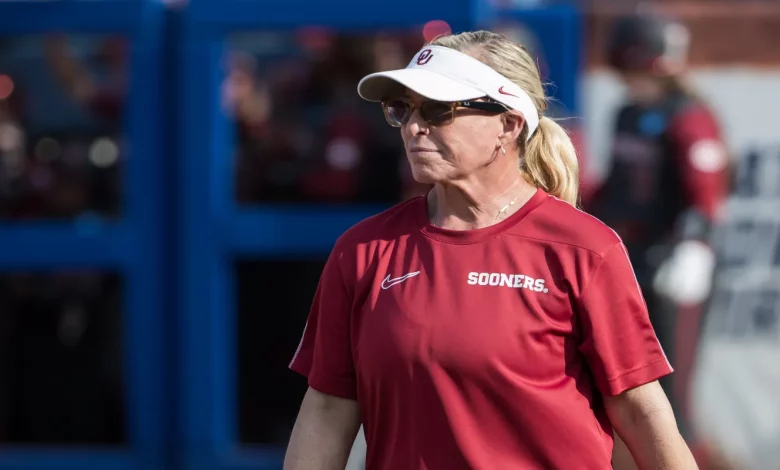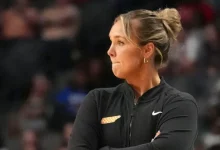Oklahoman Patty Gasso criticizes the NCAA for their WCWS format: “It is unfair to the athletes.”

Patty Gasso, the celebrated head coach of the Oklahoma Sooners softball team, has never shied away from speaking out on behalf of her players. Known for leading one of the most successful programs in NCAA softball history, Gasso’s voice carries significant weight in the sport. Recently, she has directed sharp criticism at the NCAA’s format for the Women’s College World Series (WCWS), declaring bluntly, “It is unfair to the athletes.”
Her comments have sparked discussion across collegiate athletics, highlighting ongoing concerns about the demands placed on student-athletes during one of the sport’s most high-profile events. Gasso’s critique opens a vital conversation about athlete welfare, fairness, and how the NCAA structures championship competitions.
This article will explore the details of Patty Gasso’s criticism, the challenges within the WCWS format, the impact on athletes, and potential reforms that could better balance competitive fairness with player well-being.
Who Is Patty Gasso and Why Does Her Opinion Matter?
Patty Gasso’s status in college softball is unparalleled. Since taking over as head coach at the University of Oklahoma in 1995, she has amassed multiple national championships and has been a pioneer in developing competitive, resilient, and highly skilled teams.
Gasso’s long career has given her a front-row seat to the evolution of the sport and the increasing physical and mental demands placed on athletes. Her players’ successes, struggles, and experiences provide her with a unique perspective that blends coaching acumen with genuine advocacy for athlete welfare.
When Gasso criticizes a system as foundational as the WCWS format, it signals more than just a difference in opinion; it highlights structural issues that need serious consideration.
The Current WCWS Format: What Does It Look Like?
The Women’s College World Series is the culmination of the NCAA softball season, featuring the top eight teams competing in a double-elimination tournament to crown a national champion.
Key aspects of the format include:
- Double-Elimination Bracket: Teams must lose twice to be eliminated, which can lead to multiple games over a few days.
- Back-to-Back Games: Teams may be required to play multiple games in a single day, especially if they fall into the loser’s bracket.
- Best-of-Three Championship Series: The final two teams face off in a best-of-three series to determine the champion.
While this structure is designed to balance fairness—by giving teams a second chance—and excitement, it also creates significant physical and mental demands on players.
Patty Gasso’s Criticism: “It Is Unfair to the Athletes”
Gasso’s central criticism focuses on how the tournament’s structure places undue strain on student-athletes, affecting their health, performance, and overall experience.
1. Physical Exhaustion and Injury Risk
The double-elimination format can force teams into grueling schedules, playing several high-stakes games in rapid succession. For example, a team dropping into the loser’s bracket might play two or three games in one day, with minimal rest.
This intense pace increases the risk of injuries, particularly for pitchers, who face arm fatigue and overuse injuries under such conditions. Field players also face cumulative physical strain that can affect their agility, reaction times, and overall performance.
Gasso has emphasized that while competition is demanding by nature, the current WCWS format exacerbates physical fatigue to levels that compromise player safety and competitive equity.
2. Mental and Emotional Toll
Beyond the physical demands, Gasso highlights the psychological pressures of the WCWS. The back-to-back games with high stakes amplify stress and mental fatigue, affecting players’ focus and emotional resilience.
The pressure to perform at peak levels under such intense conditions can be overwhelming, especially for younger athletes who may not have developed full coping mechanisms yet.
Gasso’s comments suggest that the format, while exciting for fans, might sacrifice the mental well-being of players in the process.
3. Uneven Playing Field and Competitive Fairness
The scheduling format can create disparities in rest time between teams, potentially giving some an unfair advantage.
For example, a team coming from the winner’s bracket might have fewer games and more rest before a critical matchup, while a team fighting through the loser’s bracket plays more games with less recovery.
Gasso argues that this unevenness challenges the ideal of fair competition and that the format sometimes rewards luck of the schedule over true team skill.
The Impact on Athletes: Voices from the Field
Gasso’s criticism reflects sentiments echoed by many players who have competed in the WCWS. Athletes often describe the tournament as the pinnacle of college softball but also one of its toughest tests.
Players cite:
- Physical Drain: The cumulative fatigue from multiple games can lead to diminished performance and increased injury risk.
- Limited Recovery Time: Short turnarounds between games leave little time for proper nutrition, rest, or mental preparation.
- Emotional Pressure: The high stakes combined with physical exhaustion create a uniquely stressful environment.
These challenges can affect not only individual performances but also team dynamics and overall tournament quality.
Broader Context: Athlete Welfare in Collegiate Sports
Gasso’s critique aligns with a growing movement in collegiate athletics emphasizing player health, safety, and mental well-being.
Recent years have seen increased focus on:
- Concussion protocols and injury prevention measures.
- Mental health resources and support for student-athletes.
- Revised practice and competition schedules to limit overuse and burnout.
The WCWS format, in many ways, stands at odds with these trends, illustrating how historic tournament structures may not have evolved sufficiently alongside emerging knowledge about athlete welfare.
Possible Alternatives and Reforms
Several ideas have been proposed to address the concerns raised by Gasso and others:
1. Adjusting the Tournament Structure
- Single-Elimination Format: Reducing the number of games could alleviate fatigue, though it sacrifices the second-chance fairness of double elimination.
- Modified Double-Elimination: Implementing longer rest periods between games or limiting the number of games played in one day could help balance fairness with athlete welfare.
2. Scheduling Changes
- Buffer Days: Introducing more rest days within the tournament schedule to allow players to recover.
- Time-of-Day Considerations: Scheduling games to avoid extremes of heat or fatigue, such as evening games after a day of rest.
3. Pitching Restrictions and Recovery Protocols
- Enforcing stricter pitch counts and mandatory rest periods to protect pitchers from overuse injuries.
4. Technological and Medical Support
- Increasing access to on-site medical and mental health professionals to support players during the tournament.
The Challenge of Change: Tradition vs. Welfare
Reforming a prestigious event like the WCWS is complicated by factors such as:
- Tradition and History: The current format has been in place for decades and is beloved by fans and broadcasters.
- Financial and Logistical Constraints: The tournament’s schedule is tightly packed to fit broadcast windows and venue availability.
- Competitive Integrity: Balancing fairness with player welfare is a delicate task; changes must maintain the tournament’s credibility.
Nonetheless, Patty Gasso’s vocal criticism adds urgency to the conversation, encouraging the NCAA and other stakeholders to reconsider the status quo.
What Could Change Mean for College Softball?
If the NCAA takes heed of Gasso’s concerns, the WCWS could evolve into a tournament that is as much about protecting athletes as it is about crowning champions.
Potential benefits include:
- Longer Careers: Reduced injury risk could prolong players’ athletic careers, including opportunities at the professional or international levels.
- Improved Competition: Well-rested athletes are more likely to perform at their best, resulting in higher-quality games.
- Enhanced Player Experience: Prioritizing welfare can improve athlete satisfaction, retention, and overall enthusiasm for the sport.
Patty Gasso’s criticism of the NCAA WCWS format underscores a critical tension in collegiate sports: the balance between tradition, competition, and the well-being of athletes. Her statement, “It is unfair to the athletes,” is not just a critique but a call to action.
By highlighting the challenges faced by student-athletes during the WCWS, Gasso advocates for a more compassionate, thoughtful approach to championship competition—one that values the health, mental well-being, and fairness owed to these young athletes.
As college sports continue to evolve, voices like Patty Gasso’s remind us that at the heart of every game are the players who deserve respect, protection, and a chance to compete on a level playing field—both physically and mentally.









